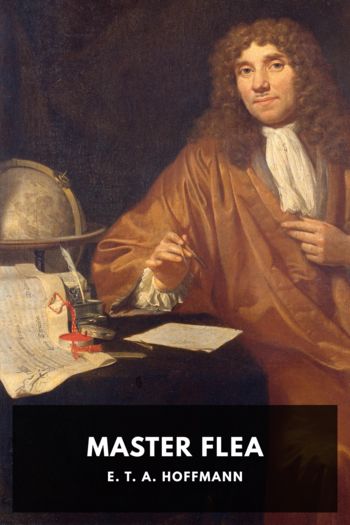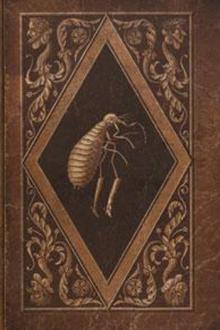Master Flea - E. T. A. Hoffmann (thriller novels to read .txt) 📗

- Author: E. T. A. Hoffmann
Book online «Master Flea - E. T. A. Hoffmann (thriller novels to read .txt) 📗». Author E. T. A. Hoffmann
“You know, my dear Mr. Tyss, that nothing is more valued by me than my late cousin, the calico-printer’s wife. She was in Maintz, and, I believe, even in the Indies, and could speak French and sing. If I owe to my cousin the unchristian name of Alina, I will forgive her that in the grave, since it is from her alone that I have learned polite manners and the art of speaking elegantly. As I was talking much of my cousin, the little princess asked after my father, my grandfather, and so on, higher and higher up the family. I opened my heart to her, told her that my mother had been almost as handsome as myself, except that I go beyond her in regard to the nose, which I derive from my father, and which is after the shape that has been usual in the family since the memory of man. Then I came to speak of the country wake, when I waltzed with Sergeant Drumstick, and wore the skyblue stockings with red clocks. Ah, dear God! we are all weak, sinful creatures! But oh! Mr. Tyss, you should have seen how the little princess, who at first had laughed and tittered, that it was a pleasure to hear her, now grew more and more quiet, and gazed on me with such odd looks, that I began to be terribly alarmed. And then think, Mr. Tyss, on a sudden, before I could prevent it, she lies on her knees before me, and will positively kiss my hand, exclaiming, ‘Yes, it is you! Now I recognise you! It is yourself!’ and when, quite astonished, I asked what it all meant—”
Here the old woman stopped, and, when Peregrine pressed her to go on, she with great gravity and precision took a mighty pinch of snuff, and said,
“You’ll know in good time, my son, what farther happened. Everything has its time and hour.”
He was now more urgent than ever with the old woman to proceed, when she burst out into a roaring fit of laughter, upon which he admonished her, with a very sour face, that his room was not exactly the place for her to play off such fooleries. But the old woman, planting her hands in her sides, seemed ready to burst. The burning red of her brow changed to an agreeable mahogany, and Peregrine was upon the point of flinging a glass of water into the old woman’s face, when she recovered her breath and speech at the same time.
“I can’t help laughing,” she said, “I can’t help laughing at the foolish little thing. No; such love is no longer on earth. Only think, Mr. Tyss—”
Here she broke out into a fresh fit of laughter, and Peregrine’s patience was well nigh exhausted. At last, with much difficulty, he got out of her that the little princess had taken up the whimsical notion of Mr. Tyss being positively determined to marry the old woman, and had compelled her solemnly to promise to reject his hand.
It seemed to Peregrine as if he were mixed up in a scene of witchery, and he felt so strangely, that even the honest old Alina appeared to him a supernatural kind of being, from whom he could not fly with sufficient speed. But she still detained him, having something to communicate in all haste, that concerned the little princess.
“It is now certain,” she said confidentially, “It is now certain, my dear Mr. Tyss, that the bright star of fortune has arisen, but it is your business to keep it favourable. When I protested to the little one that you were desperately smitten with her, and far from any idea of marrying me, she replied, that she could not be convinced of it and give you her hand till you had complied with a wish that had long sat near her heart. She says that she had a pretty little negro boy in her service who had fled from her; I have indeed denied it, but she maintains that the boy is so little he might live in a nutshell.”
“Nothing will ever come of this,” exclaimed Peregrine violently, well knowing what the old woman was driving at, and rushed out of the room, and then out of the house, with great vehemence.
It is an established custom, that when the hero of a tale is under any violent agitation, he should run out into a forest, or at least, into some lonely wood, and the custom is good, because it really prevails in life. Hence it could not be otherwise with Mr. Tyss, than that he ran from his house without stopping, till he had left the city behind him and reached a remote wood. Moreover, as in a romantic history no wood must be without rustling leaves, sighing breezes, murmuring brooks, etc., etc. it is to be supposed that Peregrine found all these things in his place of refuge. Upon a mossy stone, the lower half of which lay in a bright brook, Peregrine sat down with a firm resolution to reflect on his strange adventures, and, if possible, find the Ariadne clue which might show the way out of this labyrinth of mysteries. The murmurs of the leaves, returning at equal intervals, the monotonous babbling of the waters, the constant clap, clap of a distant mill, soon formed a ground which regulated the thoughts so that they no longer rushed wildly together without time or rhythms, but became an intelligible melody. Thus, after sitting some time on this pleasant spot, he got to reflect calmly.
“In reality,” he said to himself, “a fantastic tale-writer could not have invented wilder events than I have actually gone through in the short space of a few days. Beauty, love itself visits the lonely misogynist, and a look, a word, is sufficient to fan, in his breast, the flames which he had dreaded without





Comments (0)